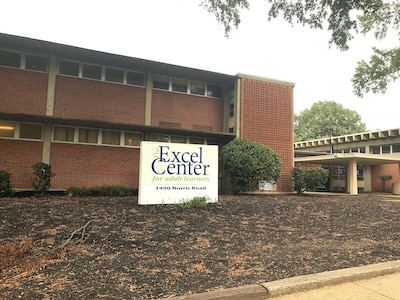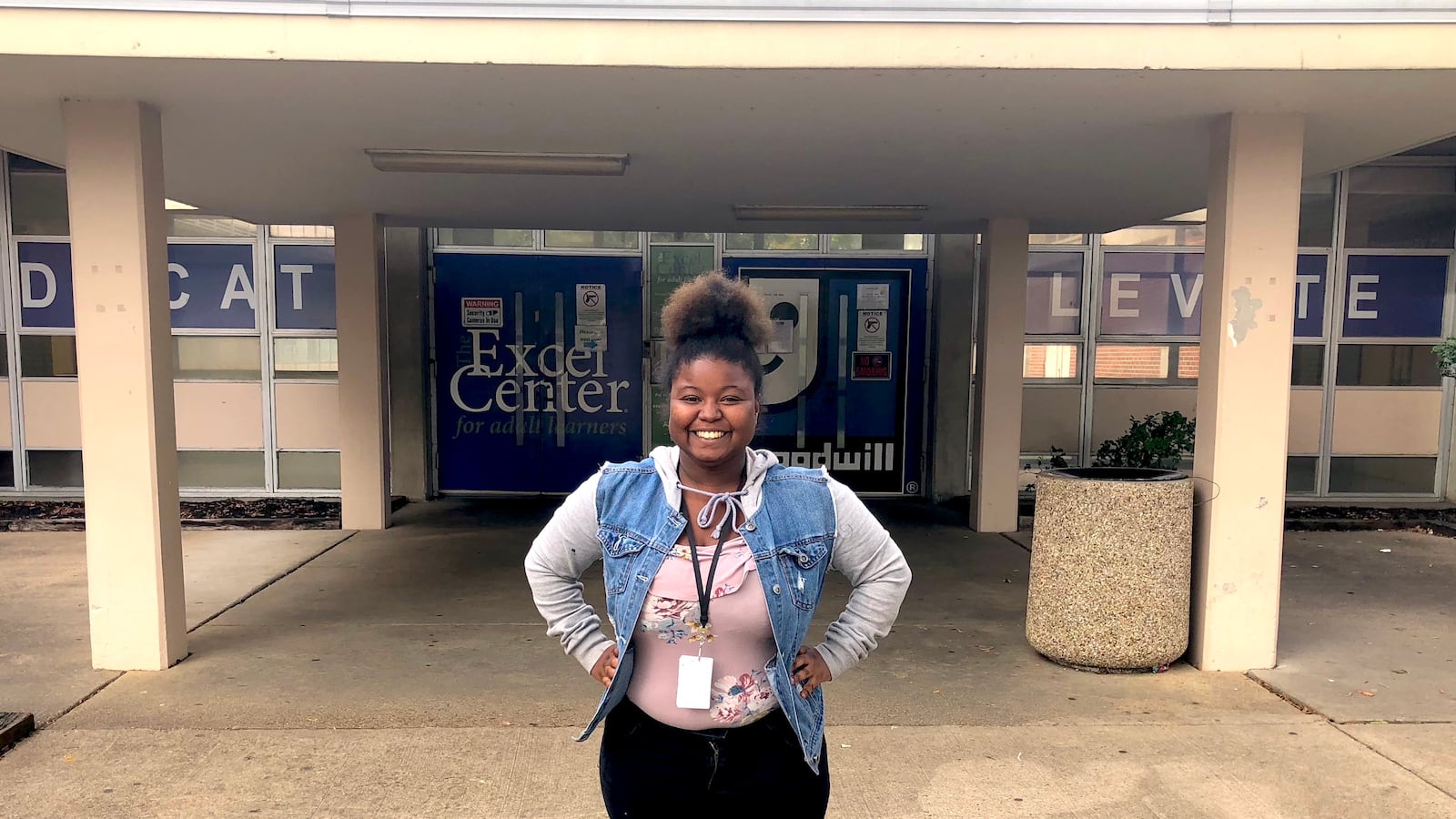Update on Oct. 30, 2018: The Shelby County Schools board approved this contract.
The only thing that was keeping 19-year-old Kennishia Pratts from a job she really needed was a high school diploma, one potential employer told her.
So Pratts decided she would go back to school. She tried to enroll at a nearby high school, but was ineligible because of her age. That’s when she turned to The Excel Center, a charter school for adults and the only place in Memphis adults can get their high school diploma — not just an equivalent commonly known as a GED.
“When they told me I could get my official high school diploma here, I was ecstatic,” Pratts said. “I’d rather have my high school diploma where I know that I’m for sure going to get into college, I’m for sure going to get this job.”
With two children to support, “I have to make a living out here,” explained Pratts, who is on track to graduate later this year.
But now Excel is slated to close at the end of this academic year because it hasn’t graduated enough students on time and has posted low scores on state standardized tests, called TNReady. By state law, any charter school on the Tennessee Department of Education’s “priority list,” composed of the state’s lowest-performing schools, must close.
That’s why Shelby County Schools is stepping in to help keep Excel’s doors open to serve what Superintendent Dorsey Hopson called a “unique population.” It would no longer be a charter school, but a “contract school,” according to district policy. The state is also supporting the switch because “as an adult high school, the Excel Center does not fit the K-12 charter model,” a state spokeswoman said.
The school board is expected to vote Tuesday on a proposed contract between the district and Goodwill Industries that would set up a different set of expectations for adult learners.
The need for schools like The Excel Center is immense. Adult education programs are scarce in Memphis, which has one of the highest poverty rates in the nation. About 2,000 students drop out of high school every year, according to the city’s main school district. In addition, Memphis has the highest percentage in the nation of young people ages 16 to 24 not in school or working. Without a high school education, it’s that much harder to find a job. Those without a high school diploma are also more likely to end up in jail.
Adult learners come with different challenges than traditional students, school leaders say. They are more likely to need child care while they are in class, have inflexible, low wage jobs, and and need more help with academics because of long gaps in education.
State policy for schools like Excel is lacking, said Candis Dawson, the school’s director. Goodwill operates at least 20 similar schools in five states where there are different standards for measuring success at adult schools. For example, most adult learners missed graduating with their classmates. Since schools qualify for Tennessee’s priority list if the percentage of students graduating on time is below 67 percent, it’s unlikely the center would ever escape the dreaded list. (In 2018, the center’s on-time graduation rate — that is, within four years and a summer of entering 9th grade — was 8.8 percent.)
“It’s not a blame on the district or the state, but we were put in a holding pattern until key players came together to say this model wouldn’t work for us,” Dawson said. Otherwise, “we would automatically continue to fail.”
To address that, the proposed $239,000 contract for no more than 500 students would establish new metrics to gauge success. Students would still take TNReady end-of-course exams like their younger counterparts.
Specifically, the requirements to keep Excel open include:
- 18 percent of students in an academic year gain their high school diploma
- 20 percent of graduates within six months are hired for a job that pays more than minimum wage, receive a job certification, such as nursing assistant, or are accepted to attend a community college or four-year university.
- 59 percent of students complete each eight-week term.
If the school fails for two straight years to meet those amended requirements, should they clear the board, Shelby County Schools could close the school.

Currently, the center employs 11 teachers for its 450 students and offers classes from 8:45 a.m. to 6:15 p.m., weekly bus passes, and free child care for children ages six weeks to 12 years. Younger children can also enroll in pre-kindergarten classes at Excel.
“They’re learning the power of education as they see their parents go to class,” said Chuck Molinski, the center’s vice president of education.
The school year is divided into five, eight-week sessions to accelerate students’ completion of credits. If needed, students attend remedial courses before enrolling in credit-bearing classes so they will be able to keep up with the faster pace. Students can enroll for a term, take a break for a term, and then return later, if needed. None of that would change under the new contract arrangement.
The average age of Excel students is 27, with the school serving students as young as 18 and as old as 84. The center also offers life-coaching to help students navigate services, such as housing and job placement. Every student is required to take a class on crafting resumes and cover letters, culminating in a presentation of a portfolio of their work. Job fairs, field trips to area businesses, and workshops on filling out college admissions paperwork is commonplace. Most students are enrolled for three or four terms before earning enough credits for a diploma. If a student has no high school credits coming in, it takes about 18 months attending classes full time to graduate. So far, the three-year-old school has graduated nearly 400 students.
A diploma, rather than a GED, is worth the extra effort, Molinski said.
“On the employer end it shows more of a dedication and devotion… Our students are having to take ACT, TNReady, and the civics exam,” he said. “It shows more dedication than just going on a computer and passing a test.”
Pratts, the Excel student, is now aiming beyond the job she was turned down before going back to school. She’s been admitted to Spelman College in Atlanta, a prestigious historically black women’s college. It’s something she never before thought possible.
“If they close [The Excel Center], a lot of people are going to be devastated because this school has helped a lot of people achieve things they never thought they would,” she said.

